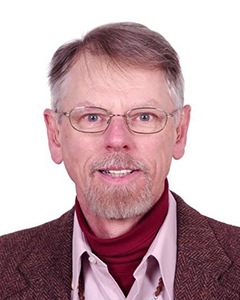Pat Munday - Department of Interdisciplinary Arts and Sciences

Professor of Science and Technology Studies
ELC 323
Contact Pat Munday »
View Pat Munday's CV »
Biography
I grew up in the Allegheny mountains, born to a working-class family with deep roots in oil well drilling and production. I took a double BS in engineering and humanities from Drexel University and an MS in science, technology & values from Rensselaer Polytechnic University. After working 5 years for the Kendall Oil/Witco Refining Company, I left my engineering career behind and took a PhD in the history & philosophy of science & technology from Cornell University. As a graduate student I was awarded my first Fulbright to perform research on the history of chemistry in Germany, and since joining Montana Tech in 1990 I received two additional Fulbright awards as a visiting scholar to Southwest University in Chongqing, China and to Ningxia University in Yinchuan, China. In 35 years with Tech I helped establish the Technical Communication program, served the faculty union as an officer and lead on the bargaining team, served environmental groups such as Trout Unlimited, and served the Mai Wah Society for the history of Chinese-American culture in Butte. I am a four-season outdoorsman: backpacking, flyfishing, hunting, and cross-country skiing define my calendar.
Research Interests
My research interests have been very interdisciplinary, taking in the history of German chemistry, semiotics, Chinese culture and history, environmental communication, and environmental history. Currently I’ve returned to my engineering roots and am involved in a project to develop sustainable (low CO2) cement production in a group that includes Montana Tech, University of California—Irvine, and Solvus Global Solutions.
Selected Honors & Awards
- Lifetime Distinguished Researcher Award, Montana Tech (2024)
- Montana Tech Merit Award (2021)
- Visiting faculty appointment, School of History, Southwest University in Chongqing, China (2019)
- Visiting faculty appointment, School of Geology, Sun Yat-sen University in Guangzhou, China (2016)
- U.S. State Department Fulbright Awards: 1988 West Germany; 2012 China; 2017 China
- Montana Tech Sabbatical Awards (1998, 2006, 2014, 2023)
- Liebig-Wöhler-Freundschafts Preis (1994)
Selected Courses Taught
- History of Western Civilization I
- Science and Technology in World History
- U.S. Environmental History at the undergraduate and graduate level
- Introduction to Ethics
- Professional Ethics
- Presenting Technical Information
- Environmental Communication at the undergraduate and graduate level
- Graduate Research Methods in Communication
Selected Publications
“As Good As Gold”, book chapter, pp. 31-42 in Larry Kapustka and Chad Okrusch, editors Wisdom River: Meditations on Fly Fishing and Life Midstream (Durville: 2023).
Co-author with Shihua Chen Brazill, “Coming Home to China: Margaret Woo’s Story”, Journal of Modern Chinese History 15: 1-25 (2021).
Co-edited with Shin Freedman, Jeanette Cockcroft, Narrative Inquiries from Fulbright Educators in China: Cross-Cultural Connections in Higher Education; and author of chapter “This too is China: Hui Muslim culture and the Fulbright experience at Ningxia University", pp. 44-56 (Routledge: 2019).
“Thinking through Ravens: Human Hunters, Wolf-birds, and Embodied Communication,” book chapter in Emily Plec, editor, Perspectives on Human- Animal Communication: Internatural Communication: 207-225 (Routledge: 207-225).
“The Na’vi as Spiritual Hunters: a semiotic exploration,” book chapter in Bron Taylor, editor, Opening Pandora’s Film pp. 161-180 (WLU University Press: 2013).
Montana’s Last Best River: The Big Hole and its People (Lyons Press: 2001).
"Politics by Other Means: Justus von Liebig and the German translation of John Stuart Mill's Logic," British Journal for the History of Science 31 (1998): 403-18.
"Social Climbing through Chemistry: Justus Liebig's rise from the niederer Mittelstand to the Bildungsbürgertum," Ambix 37 (1990): 1-19. Reprinted in Die Chemie in ihrer Anwendung auf Agricultur und Physiologie, 1. Ergäzungsband, Wilhelm Lewicki, Ed. (AgriMedia, 1995): 254-273.
"A New View of Liebig," Mitteilungen 11 1995): 3 - 15. A publication of the German Chemical Society.
Selected Funded Research
2018. Competitive Stage II award, “Butte's Wah Chong Tai Mercantile: restoring Chinese American history for the 21st century”, Partners in Preservation, Main Street, National Trust for Historic Preservation, on behalf of the Mai Wah Society. $131,996. A Stage I award and various other matching awards brought the total to $263,133.
2007. “Science, Society, and Superfund: A Social History of America’s Largest Superfund Site,” Science & Society Scholar Program of the National Science Foundation. $141,762.
2005. “German Gulch Watershed Restoration Project,” Montana’s Natural Resource Damage Program on behalf of the George Grant Chapter of Trout Unlimited. Written jointly with Josh Vincent, PE, of Water & Environmental Technologies. Request: $912,519, plus $180,736 raised in matching awards for a total of $994,245.